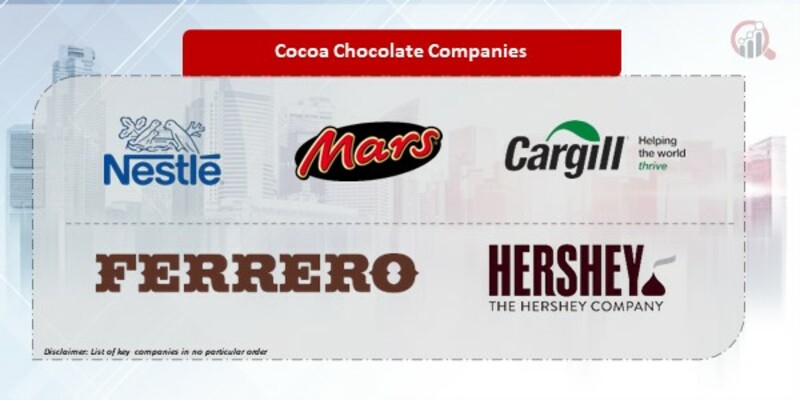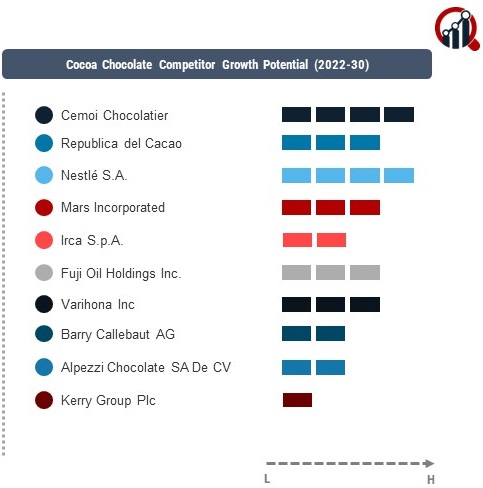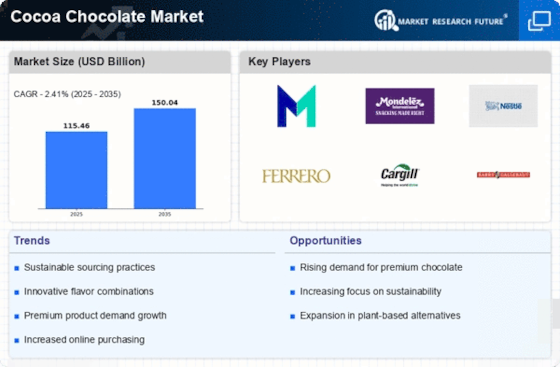Top Industry Leaders in the Cocoa Chocolate Market

Strategies Adopted by Cocoa Chocolate Key Players
Innovation and Product Differentiation: To stay competitive, major players in the cocoa chocolate market are heavily investing in innovation and product differentiation. This includes the development of new flavors, textures, and packaging to meet evolving consumer preferences. Mars, for instance, has introduced limited-edition flavors for its flagship brands, creating excitement and driving consumer engagement.
Sustainability Practices: With increasing consumer awareness regarding ethical sourcing and environmental impact, companies are integrating sustainability into their supply chains. Mondelez and Nestlé, for example, have committed to sourcing 100% sustainable cocoa by supporting initiatives like the Cocoa Life and Nestlé Cocoa Plan, respectively. Such commitments not only enhance the companies' corporate social responsibility but also appeal to socially conscious consumers.
Digital Marketing and E-commerce: The advent of digitalization has prompted chocolate manufacturers to enhance their online presence and leverage e-commerce channels. Hershey's, for instance, has implemented robust digital marketing strategies to connect with consumers through social media and online platforms. Additionally, the expansion of e-commerce allows companies to reach a broader audience and facilitates direct-to-consumer sales.
Cocoa Chocolate Market is characterized by intense competition, driven by the ever-growing demand for premium and artisanal chocolate products. As consumers increasingly seek high-quality and ethically sourced chocolates, key players in the industry are compelled to adopt innovative strategies to maintain and expand their market share.
Key Players in the Cocoa Chocolate Market
Cemoi Chocolatier (France),
Republica del Cacao (Ecuador),
Nestlé S.A. (Switzerland),
Mars Incorporated (U.S.),
Irca S.p.A. (Italy),
Fuji Oil Holdings Inc. (Japan),
Guittard Chocolate Co. (U.S.), Ghirardelli Chocolate Co. (U.S.),
Varihona Inc. (France),
Barry Callebaut AG (Switzerland),
Alpezzi Chocolate SA De CV (Mexico),
Kerry Group Plc (Ireland),
Olam International Ltd. (Singapore),
Tcho Ventures Inc. (U.S.),
The Hershey Company (U.S.),
Cargill, Incorporated (U.S.),
Blommer Chocolate Company (U.S.),
Foley's Candies LP (Canada),
Puratos Group Nv (Belgium),
Ferrero International S.A. (Italy),
Factors for Market Share Analysis
Quality and Brand Reputation: Consumers often associate chocolate with indulgence, and the quality and reputation of a brand play a crucial role in purchasing decisions. Companies that consistently deliver high-quality products and maintain a positive brand image tend to secure a larger market share.
Innovative Product Offerings: The ability to introduce innovative and unique chocolate products that align with changing consumer preferences is a significant factor in gaining and retaining market share. Brands that stay ahead of trends and offer diverse options have a competitive advantage.
Sustainability Practices: Given the growing importance of ethical and sustainable practices, companies committed to responsible sourcing and environmentally friendly processes are likely to attract a larger consumer base. Market leaders actively promoting sustainable initiatives have a competitive edge in this context.
Global Reach and Distribution Networks: Companies with a robust global presence and efficient distribution networks can quickly adapt to regional demands and preferences. The ability to reach a diverse consumer base and respond to market dynamics is critical for maintaining market share.
New and Emerging Companies
While established players dominate the market, several new and emerging companies are making significant strides in the cocoa chocolate industry. Artisanal and craft chocolate makers, such as Mast Brothers and Taza Chocolate, are gaining popularity by offering unique, small-batch products with an emphasis on quality ingredients and craftsmanship. These companies often target niche markets, catering to consumers seeking a more personalized and authentic chocolate experience.
Industry News and Current Company Investment Trends
Recent industry developments highlight a growing emphasis on health-conscious choices, as consumers seek chocolates with added functional benefits. Companies are investing in research and development to create chocolates with reduced sugar content, incorporating superfoods, and exploring plant-based alternatives. Dark chocolate, with its perceived health benefits, is witnessing increased demand.
Furthermore, strategic partnerships and acquisitions are shaping the competitive landscape. Large companies are acquiring smaller, innovative players to expand their product portfolios and tap into niche markets. Collaborations between chocolate manufacturers and technology companies are also on the rise, with a focus on enhancing production efficiency and sustainability practices.
Overall Competitive Scenario
The cocoa chocolate market is witnessing dynamic changes driven by consumer preferences, sustainability concerns, and technological advancements. Established players are adapting to these trends through strategic initiatives, while new entrants are bringing innovation and diversity to the industry. As the market continues to evolve, companies that can balance tradition with innovation, maintain ethical and sustainable practices, and effectively navigate the digital landscape will be well-positioned to thrive in the competitive cocoa chocolate market.
Mars, Incorporated: As one of the leading players, Mars has a strong global presence with popular brands like Snickers, M&M's, and Twix. The company has invested heavily in sustainable sourcing practices and has leveraged its diverse product portfolio to appeal to a wide range of consumer preferences.
Mondelez International: The owner of iconic brands such as Cadbury and Toblerone, Mondelez has a significant market share. The company has been focusing on product innovation and has introduced variations to cater to health-conscious consumers, such as dark chocolates with added health benefits.
Ferrero Group: Known for Ferrero Rocher and Nutella, Ferrero has positioned itself as a premium chocolate and confectionery brand. The company has emphasized product quality and unique flavor profiles to distinguish itself in a competitive market.
Hershey Company: A prominent player in the North American market, Hershey's is recognized for its classic milk chocolate products. The company has expanded its portfolio through acquisitions and partnerships, aiming to tap into emerging trends and consumer preferences.
Nestlé SA: Nestlé is a global giant in the food and beverage industry, and its chocolate division boasts brands like KitKat and Nestlé Crunch. The company has been actively involved in sustainability initiatives, including responsibly sourced cocoa and reducing its environmental impact.












